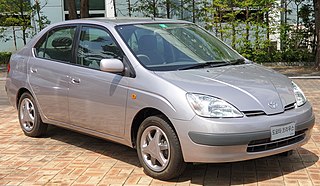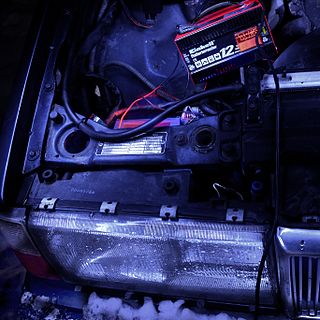
A hybrid vehicle is one that uses two or more distinct types of power, such as submarines that use diesel when surfaced and batteries when submerged. Other means to store energy include pressurized fluid in hydraulic hybrids.
Think Global was a Norwegian electric car manufacturer located in Bærum, which manufactured cars under the TH!NK brand. Production of the Think City was stopped in March 2011 and the company filed for bankruptcy on June 22, 2011, for the fourth time in 20 years. The company was bought soon after by Electric Mobility Solutions AS and production ceased in August 2012 with no more announcements regarding future production. As of October 2010, a total of 2,500 units had been manufactured at Oslo-based TH!NK's production facility.

The General Motors EV1 is an electric car produced and leased by General Motors from 1996 to 1999. It was the first purpose-designed electric vehicle of the modern era from a major automaker and the first GM car designed to be an electric vehicle from the outset.

The Toyota RAV4 EV is an all-electric version of the popular RAV4 SUV produced by Toyota until 2014. Two generations of the EV model were sold in California, and to fleets elsewhere in the US, with a gap of almost ten years between them.

A plug-in hybrid electric vehicle (PHEV) is a type of hybrid electric vehicle equipped with a rechargeable battery pack that can be replenished by connecting a charging cable into an external electric power source, in addition to internally by its on-board internal combustion engine-powered generator. While PHEVs are predominantly passenger cars, there are also plug-in hybrid variants of sports cars, commercial vehicles, vans, utility trucks, buses, trains, motorcycles, mopeds, military vehicles and boats.

Vehicle-to-grid (V2G) describes a system in which plug-in electric vehicles (PEV) sell demand response services to the grid. Demand services are either delivering electricity or reducing their charging rate. Demand services reduce pressure on the grid, which might otherwise experience disruption from load variations. Vehicle-to-load (V2L) and Vehicle-to-vehicle (V2V) are related, but the AC phase is not sychronised with the grid, so the power is only available to an "off grid" load.

The Honda EV Plus was an experimental electric vehicle which was the first battery electric vehicle from a major automaker that did not use lead acid batteries. Roughly 340 EV Plus models were produced and released. Production of the EV Plus was discontinued in 1999 after Honda announced the release of its first hybrid electric vehicle, the Honda Insight.

The Honda Clarity is a nameplate used by Honda on alternative fuel vehicles. It was initially used only on hydrogen fuel-cell electric vehicles such as the 2008 Honda FCX Clarity, but in 2017 the nameplate was expanded to include the battery-electric Honda Clarity Electric and the plug-in hybrid electric Honda Clarity Plug-in Hybrid, in addition to the next generation Honda Clarity Fuel Cell. Clarity production ended in August 2021 with US leases for the fuel cell variant continuing through to 2022.

A battery charger, recharger, or simply charger, is a device that stores energy in a battery by running an electric current through it. The charging protocol depends on the size and type of the battery being charged. Some battery types have high tolerance for overcharging and can be recharged by connection to a constant voltage source or a constant current source, depending on battery type. Simple chargers of this type must be manually disconnected at the end of the charge cycle. Other battery types use a timer to cut off when charging should be complete. Other battery types cannot withstand over-charging, becoming damaged, over heating or even exploding. The charger may have temperature or voltage sensing circuits and a microprocessor controller to safely adjust the charging current and voltage, determine the state of charge, and cut off at the end of charge. Chargers may elevate the output voltage proportionally with current to compensate for impedance in the wires.
MIEV (Mitsubishi In-wheel motor Electric Vehicle) or MiEV (Mitsubishi innovative Electric Vehicle) is the name given by Japanese automaker Mitsubishi Motors (MMC) to its alternative propulsion technologies. From late 2006, “MiEV” encompasses all of Mitsubishi Motors’s electric drive systems work, including lithium-ion batteries, in-wheel motors and other technologies related to electric vehicle (EV), hybrid-electric vehicle and fuel-cell vehicles.

A charging station, also known as a charge point or electric vehicle supply equipment (EVSE), is a power supply device that supplies electrical power for recharging plug-in electric vehicles.
Cobasys LLC supplies nickel metal hydride (NiMH) batteries, battery control systems, and packaged solutions for automotive applications, uninterruptible power supplies, telecommunications applications, and distributed power generation. For 8 years ending in 2009, Cobasys was a 50-50 joint venture between California-based Chevron Corporation and Michigan-based Energy Conversion Devices, Inc. The intermediary hierarchy of ownership was that Cobasys LLC was owned by Chevron's subsidiary Chevron Technology Ventures LLC, and ECD Ovonics' subsidiary Ovonic Battery Company. Cobasys spent $180 million in funding from Chevron Technology Ventures, and the two owners were unable to agree on further funding of the company. After arbitration between the owners had stalled, a buyer was found.

Better Place was a venture-backed international company that developed and sold battery charging and battery switching services for electric cars. It was formally based in Palo Alto, California, but the bulk of its planning and operations were steered from Israel, where both its founder Shai Agassi and its chief investors resided.

The Mitsubishi i-MiEV is a five-door hatchback electric car produced in the 2010s by Mitsubishi Motors, and is the electric version of the Mitsubishi i. Rebadged variants of the i-MiEV are also sold by PSA as the Peugeot iOn and Citroën C-Zero, mainly in Europe. The i-MiEV was the world's first modern highway-capable mass production electric car.
The lithium-titanate or lithium-titanium-oxide (LTO) battery is a type of rechargeable battery which has the advantage of being faster to charge than other lithium-ion batteries but the disadvantage of having a much lower energy density.

An electric vehicle charging network is an infrastructure system of charging stations to recharge electric vehicles. Many government, car manufacturers, and charging infrastructure providers sought to create networks. Today, charging network vendors include either proprietary solutions, or hardware agnostic solutions. Hardware-agnostic vendors allow for customers to switch out their charge stations and/or switch to a different network vendors ; whereas proprietary vendors do not allow customers to switch.

Coda Automotive Inc. was a privately held American company headquartered in Los Angeles, California. The company designed and assembled lithium-iron phosphate (LiFePO4) battery systems for automotive and power storage utility applications, and electric cars. Miles Automotive partnered with Hafei and Qingyuan Electric Vehicle to establish Coda Automotive as an affiliate company. The name CODA comes from the musical term for the concluding passage of a piece of music. Coda Automotive has said that it chose the name because its electric vehicle technology represents an end for combustion engine vehicles, and the start of the electric vehicle era.

The fleet of light-duty plug-in electric vehicles in Japan totaled just over 300,000 highway legal plug-in electric vehicles in circulation at the end of 2020, consisting of 156,381 all-electric passenger cars, 136,700 plug-in hybrids, and 9,904 light-commercial vehicles.

SemaConnect was an electric vehicle infrastructure company located in Bowie, Maryland founded in 2008 by entrepreneur, Mahi Reddy. The company and its assets were acquired by Blink Charging in June 2022. On June 23, 2023, Blink Charging officially migrated all remaining SemaConnect infrastructures onto their own network, therefore phasing out the use of the SemaConnect brand entirely.

Blink Charging Co. is an American electric vehicle charging network operator headquartered in Miami Beach, Florida. A smaller EV charging network in the United States, it has over 51,000 chargers globally.















